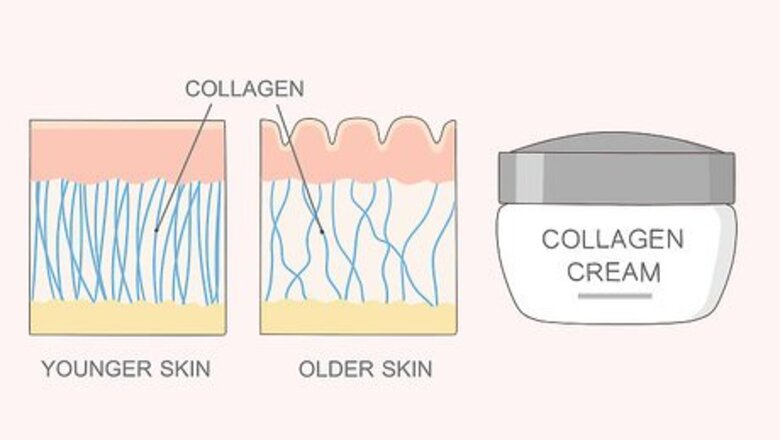
views
Skin-Firming Moisturizers
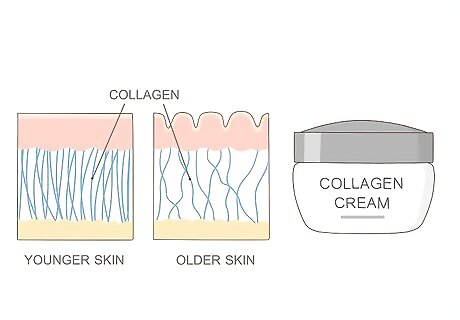
Use a collagen cream to keep skin supple. When shopping for skincare products, look for facial moisturizers that contain tretinoin and retinol, which can help boost collagen formation in your skin. Collagen is a part of your skin that helps it remain moisturized and elastic. Over time, the collagen in facial skin breaks down, contributing to both sagging and wrinkles. Using a collagen cream may help replenish your skin’s natural collagen, making your skin appear tighter and more moisturized. Not all collagen creams contain the same added ingredients or percentage of collagen. When using a collagen cream, read the label carefully to see how often the cream should be applied.
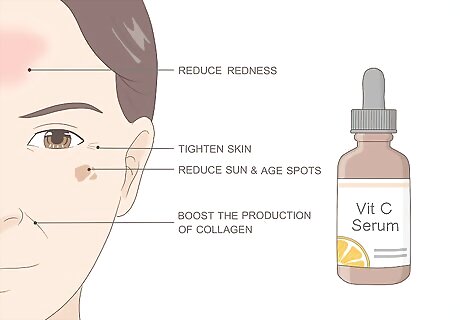
Try a vitamin C serum to brighten and tighten your skin. Vitamin C serums contain concentrated doses of vitamin C that can reduce wrinkles, as well as sun and age spots. Vitamin C also plays an important part in collagen production within the skin. Unlike drinking vitamin C (which is also healthy!), serums allow your skin direct contact with the vitamin so that the benefits are absorbed right into your skin. Vitamin C serums don’t create side effects for many, so this is a great option if you have any allergies or skin sensitivities. Dermatologists advise applying vitamin C serum in the morning following your cleanser and toner. However, always check the label on your vitamin C serum to see how often it is safe to use.
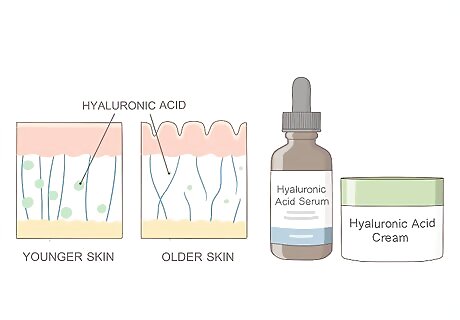
Apply a hyaluronic acid serum or cream for hydrated, plump skin. Hyaluronic acid is a naturally-produced molecule that helps keep your skin looking young. Applying a hyaluronic acid moisturizer daily can help limit wrinkles and allows your skin to stretch, making it appear tighter and healthier. Hyaluronic acid is generally considered a great option for all skin types and does not usually trigger allergic reactions, breakouts, or rosacea. Thus, it can usually be added to your daily skincare routine.
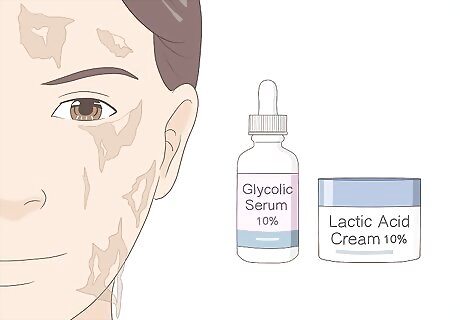
Use a cream or serum with glycolic or lactic acid to tighten skin. These products work through exfoliation, meaning they cause shedding of the surface skin. Be aware that using creams with glycolic or lactic acid can increase your skin’s sensitivity to UV. If you start noticing that your skin is getting redder in the sun than before you started using this cream, stop using it and try a different treatment. Check the ingredients before you buy, because the acid concentration should be 10 percent or less to be safe.
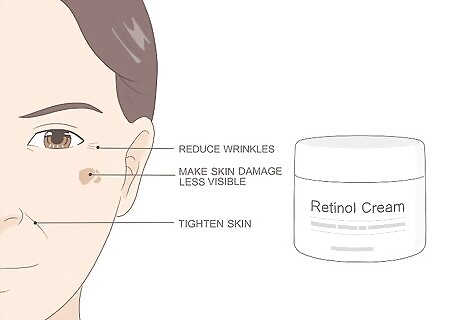
Use retinol to reduce the wrinkles on your face. Retinol is one of the most popular skin-tightening ingredients and can be found at almost any pharmacy, drug store, or skincare retailer. Retinol creams have been shown to help reduce wrinkles and boost collagen production. While retinol can be the most effective skin-tightening ingredient for some, it comes with a long list of potential side effects, including dryness, irritation, sunburn, redness, swelling, and blistering. Because retinols can cause irritation, it is generally recommended that you apply them on alternating days. If you experience any side effects, decrease your usage to 1 time per week. Contact your doctor if the side effects persist or are extreme. Retinol may also help reduce acne outbreaks.
Professional Treatments
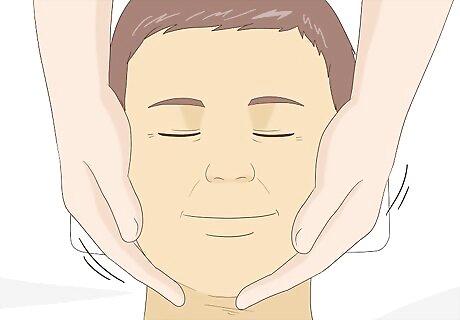
Get a facial massage for a painless overall lift. Facial massages are a generally enjoyable treatment with mood-improving effects. They may also help sculpt and lift your skin by working out the muscles in your face. While facial massages can cost several hundred dollars per treatment, you can usually expect long-lasting results after only a few treatments. At most skincare establishments, you can choose to add a skin-tightening moisturizer to your facial massage, such as a hyaluronic acid serum, for an added benefit for your skin. While getting a facial massage done by a professional will likely produce the best results, you can also purchase an at-home facial massaging tool. These are available online and at several higher-end skincare retailers and generally cost about $50-$500.
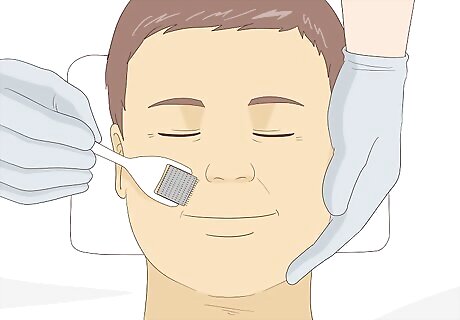
Microneedle for quicker skin-tightening results. Microneedling is a minimally invasive, non-surgical procedure that uses micro needles to puncture the skin, causing it to generate new collagen and tissue. While microneedling will likely cause some immediate irritation and redness, these side effects usually subside within a few days. Talk with a skincare professional to see how much the procedure will cost. At-home microneedling devices cost anywhere from $10 to $300. At-home microneedling devices don’t pierce the skin, so you won’t see as much change.
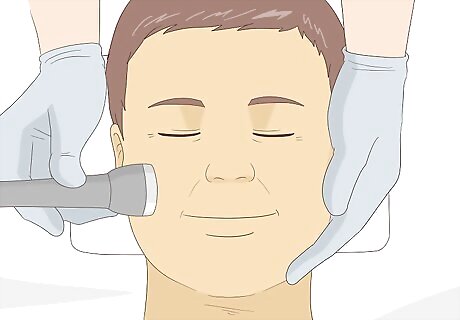
Get an ultrasound facial treatment for longer-lasting results. Since it was approved by the FDA, ultrasound energy has become a popular treatment for tightening facial skin. Ultrasound energy treatment is a nonsurgical treatment that pulsates ultrasound heat energy deep into the skin, causing it to lift and tightened. Like other non-surgical treatments, ultrasound energy treatment also boosts collagen production. While the procedure is still relatively new, most patients see results within 3-6 months of their first treatment that lasts for several years. On average, one ultrasound energy treatment costs about $2,000. Ultrasound energy treatments are noninvasive and usually cause little to no irritation. As such, no recovery time is need, so you can usually return to your regular routine immediately following the treatment.
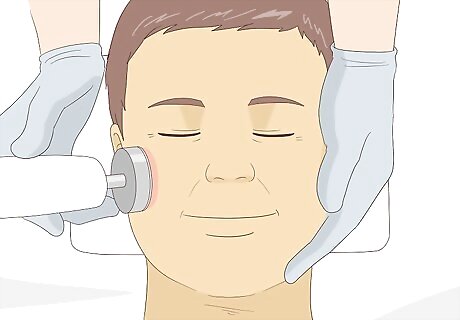
Try a radiofrequency facial to stimulate collagen production. Similar in many ways to an ultrasound treatment, radiofrequency facials are performed with a machine that uses radiofrequency to heat the deeper layers of your facial skin to increase collagen production. Keep in mind, though, that you may need multiple treatments to see the best results. Radiofrequency facials usually cost about $100 per half hour session, with the results lasting about six weeks.
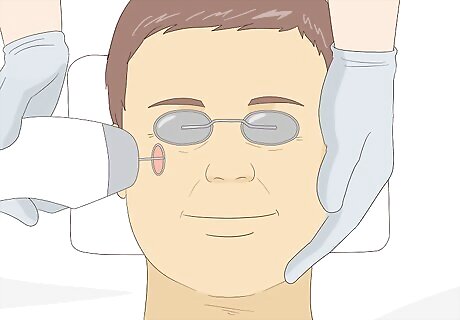
Do a laser skin resurfacing procedure to reduce wrinkles. While laser skin resurfacing procedures are usually done to get rid of scars, warts, rosacea, or spider veins, ablative lasers, such as CO2 and Erbium lasers, can also be used to reduce the appearance of fine lines and wrinkles. These lasers help tighten and smooth out your face by removing the top, more damaged layers of your skin. The costs of laser skin resurfacing ranges from around $1,500 to $3,000. While the procedure is generally safe, laser skin resurfacing should be performed by a doctor with knowledge of your medical history and desired results. Laser skin resurfacing is more invasive than other tightening treatments, such as an ultrasound treatment, but less so than a surgical facelift. Laser treatments can take up to several months to completely heal, but generally produce long-lasting results.
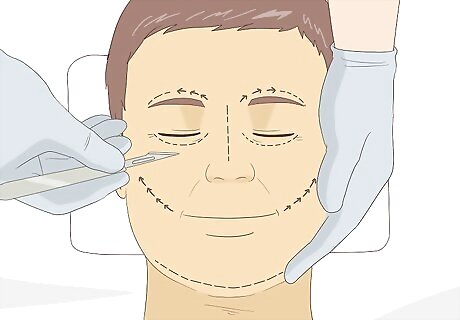
Get a facelift to permanently tighten your face skin. Also known as a rhytidectomy, a facelift is a surgical procedure that removes excess skin, redistributes fat and tissue, and tightens skin on the face and neck. As a surgical procedure, facelifts are highly invasive, expensive, and take several weeks or months to heal. Yet, for many patients, a facelift can produce long-lasting results, making the facial skin feel tighter and smoother for years to come. The average cost of a facelift is a little over $8,000. There are several serious risks and side effects associated with a facelift surgery, including hematoma, infection, and nerve injuries, to name a few. Because the procedure is highly invasive and carries a number of risks, not everyone is a good candidate for a facelift. Consult with your doctor to see if it is safe for you to consider getting a facelift.
Natural Techniques
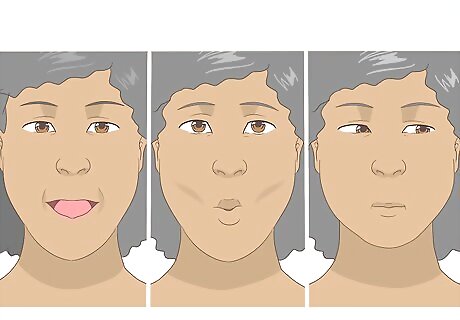
Try facial yoga to gain facial muscle tone. Facial yoga is a series of exercises you do with your face. Studies have shown their effectiveness, particularly in creating fuller cheeks, but only if you are willing to put in a lot of time. To achieve results from facial yoga, practice daily for about half an hour. Though facial yoga does require a lot of time, it’s an inexpensive and noninvasive method.
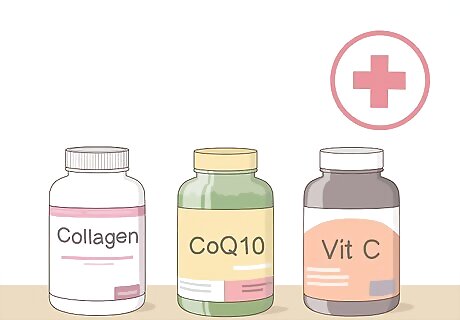
Take supplements that may help tighten facial skin. Recent studies have shown that adding collagen, zinc, CoQ10, and vitamin C supplements to your daily routine can help reduce the appearance of fine lines and tighten the skin on your face. While the jury is still out on how much of a difference supplements can make, it might be worth talking to your doctor about adding a few or all of these supplements to your diet. All of these potentially skin-tightening supplements are available in capsule and powder form.
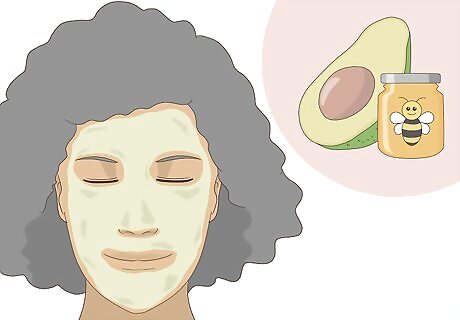
Try a natural face mask for quick skin-tightening results. All-natural face masks are all the rage right now, and with good reason. Be sure to make your mask with skin-healthy ingredients, like coconut or olive oil, plain yogurt, vinegar, avocado, honey, and white tea. While the long-term effects of face masks are still debated, many of these masks will make your facial skin feel tighter immediately, making them a great short-term option. Learn how to make an all natural face mask at home for a particularly inexpensive way to tighten your facial skin.
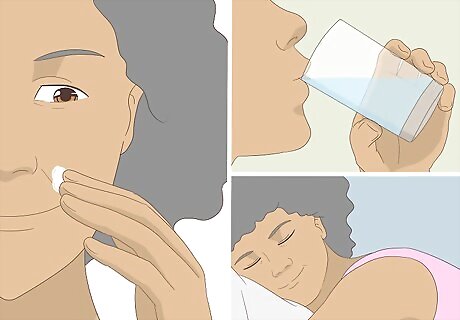
Prevent loosening skin naturally by taking care of your health. Using sunscreen, drinking plenty of water, getting enough sleep, maintaining a healthy diet, exercising regularly, managing and avoiding smoking and overindulging in alcohol can all help your skin stay in great shape.




















Comments
0 comment